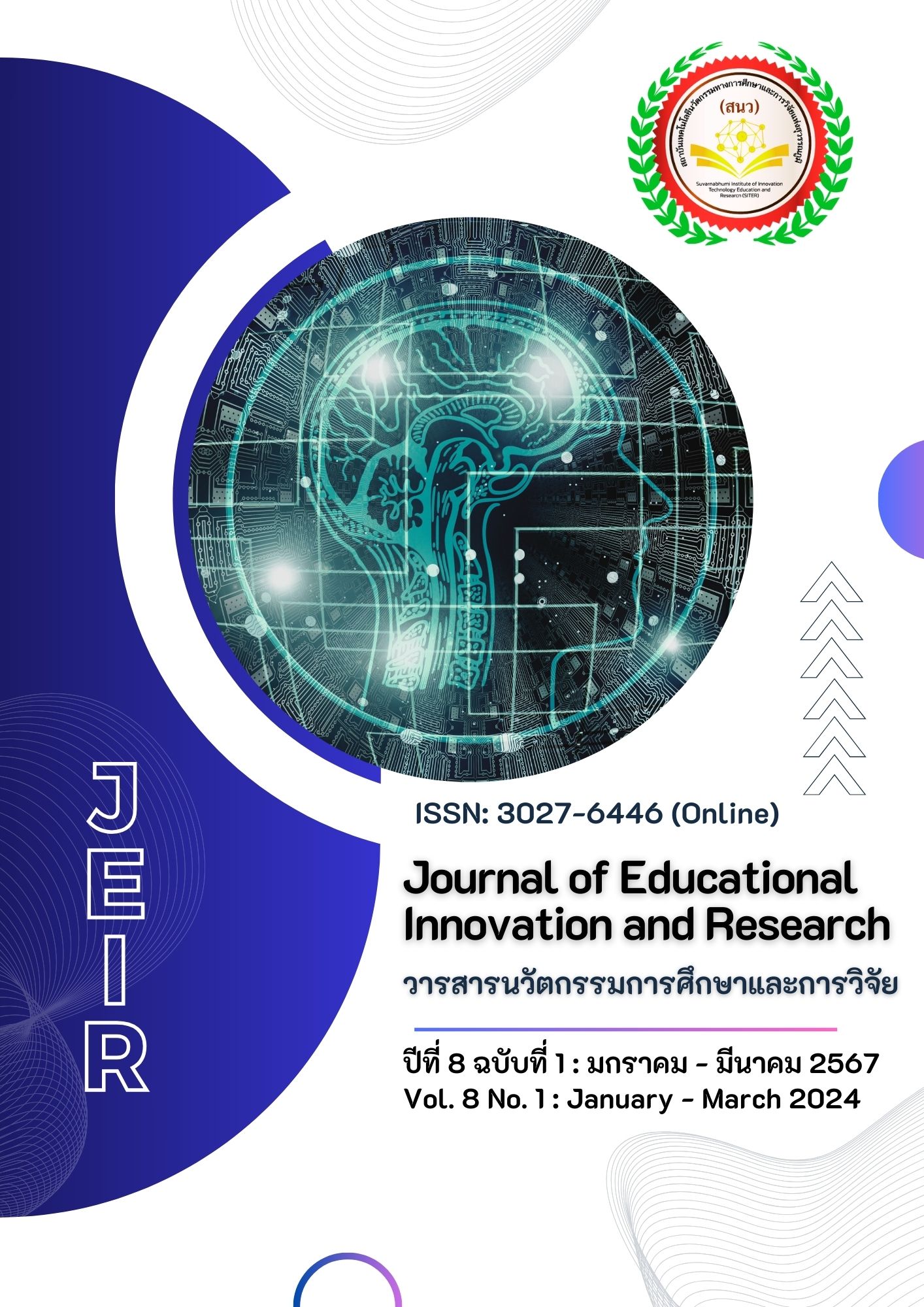แนวทางการพัฒนาสมรรถนะเพื่อเพิ่มขีดความสามารถของ นักทรัพยากรมนุษย์หลังโควิด-19 ตามความต้องการของตลาดแรงงานภาคอุตสาหกรรม ในเขตพัฒนาพิเศษภาคตะวันออก
Main Article Content
บทคัดย่อ
การวิจัยครั้งนี้มีวัตถุประสงค์ในการศึกษาสมรรถนะเพื่อเพิ่มขีดความสามารถของนักทรัพยากรมนุษย์หลังหลังโควิด-19 ตามความต้องการของตลาดแรงงานภาคอุตสาหกรรมในเขตพัฒนาพิเศษภาคตะวันออก ผู้วิจัยใช้ระเบียบวิธีวิจัยแบบผสมผสาน คือการศึกษาเชิงปริมาณ โดยใช้แบบสอบถามในการเก็บข้อมูลจำนวน 450 ตัวอย่าง จากประชากรในจังหวัดฉะเชิงเทรา ชลบุรีและระยอง ส่วนการศึกษาเชิงคุณภาพ จากการสัมภาษณ์เชิงลึกของผู้บริหารในภาคอุตสาหกรรมหรือผู้ที่มีส่วนเกี่ยวข้องกับการบริหารและการพัฒนาทรัพยากรบุคคลขององค์กรในเขตพัฒนาพิเศษภาคตะวันออก จำนวน 12 คน ทั้งนี้ การวิเคราะห์ข้อมูลจากตัวอย่างเพื่ออ้างอิงไปยังประชากรที่ศึกษาใช้สถิติการทดสอบที (t-test) ความแปรปรวนทางเดียว (One-way ANOVA) และค่าสัมประสิทธิ์สหสัมพันธ์แบบเพียร์สัน (Pearson Correlation)
การวิจัยพบว่า คุณลักษณะของผู้ประกอบการภาคอุตสาหกรรม ขีดความสามารถของนักทรัพยากรมนุษย์ภาคอุตสาหกรรม ขีดความสามารถของนักทรัพยากรมนุษย์หลังโควิด-19มีความสัมพันธ์และมีอิทธิพลโดยตรงกับขีดความสามารถของนักทรัพยากรมนุษย์ตามความต้องการของตลาดแรงงานภาคอุตสาหกรรม ในเขตพัฒนาพิเศษภาคตะวันออกในเชิงบวก ที่ระดับนัยสำคัญ .05
ทั้งนี้ เมื่อนักทรัพยากรมนุษย์ได้รับการเสริมสร้างและพัฒนาสมรรถนะเพื่อเพิ่มขีดความสามารถสำหรับแรงงานตามความต้องการของภาคอุตสาหกรรมที่ตอบโจทย์บุคลากรอย่างเหมาะสม องค์กรก็จะเกิดประสิทธิภาพและประสิทธิผลที่ดีขึ้น ดังนั้น จึงจำเป็นต้องใช้ปัจจัยเหล่านี้ร่วมบูรณาการให้นักทรัพยากรมนุษย์มีความรู้กว้าง รู้ลึก รู้รอบ มีทักษะ ความสามารถ และมีคุณสมบัติการปรับตัวในสภาวะการทำงาน ที่เปลี่ยนแปลงไปอย่างรวดเร็ว โดยมีความสอดคล้องกับความต้องการของอุตสาหกรรมและตลาดแรงงาน ซึ่งองค์กรและบุคคลที่เตรียมพร้อมด้านทักษะเหล่านี้ จะมีโอกาสสูงในการเติบโตและประสบความสำเร็จ ในอนาคต
Article Details

อนุญาตภายใต้เงื่อนไข Creative Commons Attribution-NonCommercial-NoDerivatives 4.0 International License.
เอกสารอ้างอิง
Akkaworn, J. (2006). Creating people who create work. Bangkok: K. Phonphim (1996).
Buachu, T. (2021). Model of competency development to increase competitiveness in the 21st century. of nursing professors under Rajabhat University [Doctoral dissertation, Srinakharinwirot University.
Chairat, P. (2019). Human resource development to support innovative organizations [Master’s Thesis, Management field Mahidol University].
Champoon, C., Kalayanamit, K., Niyomyat, S and Lakkhanaphichanchat, T. (2021). Human resource development in the era of digital transformation. Periscope Education Journal, 8(1), 195-208.
Chayamarit, S. (2021). Developing human resources to support the digital age of government organizations and private. Journal of Interdisciplinary Humanities and Social Sciences, 4(1), 49-60.
Chunuch, C. (2019).Personnel development under the Bangkok Civil Service Development Institute [Master's Thesis, Ramkhamhaeng University].
Donlao, T. (2021). The future of Thai workers under changing economic conditions. Journal of Administrative and Management Innovation, 9(1), 35-44.
Duanyai, N. (2019). Developing the potential of criminal court personnel in the digital era [Master's Thesis, Ramkhamhaeng University].
Insaard, S. (2021). Microlearning design in the digital era. Journal of Educational Technology and Communication, 16(20), 16-31.
Kanitcharangkun, P. (2017). Human resource development of the Royal Thai Army Development Unit Military Development Command Royal Thai Armed Forces Headquarters To support the change to the era Thailand 4.0 [Master’s Thesis,Thammasat University].
Kerdchuay, N. (2022). Guidelines for developing human resource management potential towards change. Converted after the outbreak of the coronavirus disease (Covid-19) in private sector organizations in the area Rayong Province Industrial Estate. National and international academic conferences "Benjamit Academic" 12th time, 16-30.
Kerdchuay, N. (2023). Human resource planning and career development [Master's thesis, Rajabhat Rajanagarindra University].
Kiatkitikul, P. and Permpian, T. (2018). Competencies of human resource professionals in organizational case studies. Retail business. 3rd Academic Conference, Kasetsart University Sriracha Campus 30 August 2018.
Laohanan, S. (2013). Human resource management. Bangkok: Thana Printing Limited Partnership.
Mclagan, P. (1997), May. Competencies: The next generation. Training and Development, 51(5),40-47.
Mondy, R. W. (2008). Human Resource Management. (10th ed.). Upper Saddle River, N.J.: Pearson Prentice Hall.
Mongkolsuebsakul, W. (2022). Guidelines for driving policy towards developing labor skills to support Changes after the COVID-19 era. Western University Research Journal Humanities and social sciences, 8(1), 267-282.
Naratapanon, N. (2012). A Model of Life Insurance Indurtry Training in Thailand [Doctoral dissertation, Pathum Thani University].
Nathamploy, C. (2019).Results-oriented management in today's society. Journal of Educational Innovation and research, 3(3), 171-178.
Office of the National Economic and Social Development Board. (2021). Economic development plan and National Society, Issue 12 (2017-2021). Bangkok: Office of the Prime Minister.
Office of the National Higher Education, Science, Research and Innovation Policy Council. (2021, October 18). Report on the development of higher education, science, research and innovation in the country in 2021. on human and labor skills required for Thailand in the post-COVID-19 world. https://www.nxpo.or.th/th/9115/
Petchkaew, C., Waeuseng, N., Adam, S., Prayoonphan, T., Krahowong, M., and Suthiwongkul, D. (2019). Developing the digital skills of Thai government personnel towards digital government. Journal of Political Administration and Law, 13(1), 197-216.
Petchuay, P., Paijit, P. and Rodsisen, R. (2021). Characteristics of entrepreneurs who have Effects on the management success of small and medium sized enterprise operators. Oil palm industry in Surat Thani province. Journal of Management Science, 8(1), 107-124.
Phonsimma, S. and Sukphet, K. (2020). Relationship of entrepreneurial characteristics. on the results of business operations Providing services for domestic tourism Thai. Dusit Thani College Journal, 14(3), 146-161.
Ruangkun, J. (2013). Organizational change: concepts, processes, and roles of administrators. Human resources. Panyapiwat Journal, 5(1), 194-203.
Sa-ar, R. and Sojipan, W. (2021). Labor needs and gaps Competencies for human resource development in border trade model cities Su-ngai Kolok District Narathiwat Province. Journal of Management Science Review, 23(2), 25-37.
Saenthong, N. (2004). Let's get to know Competency. Bangkok: H. R. Center.
Surin, N. (2019). Developing personnel potential in the transition to the digital era Office case study Secretary of the Inter-Court Arbitration Committee, Court Office fair [Master's thesis, Ramkhamhaeng University].
Suwan, S. (2018). Human resource and organizational development strategies. Nakhon Pathom: Phetkasem Printing Group Co., Ltd.
Usaengthong, N. (2022). Human resource development management under the digital transformation of the Bangkok Mass Transit Authority [Master's thesis, Siam University].
Yamnil, S. (2021).Sustainable human resource development. (2nd printing). Bangkok: Dhurakij Pundit University.


